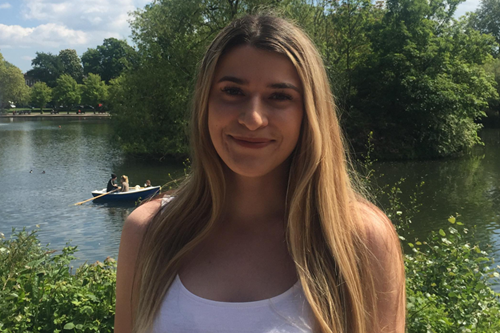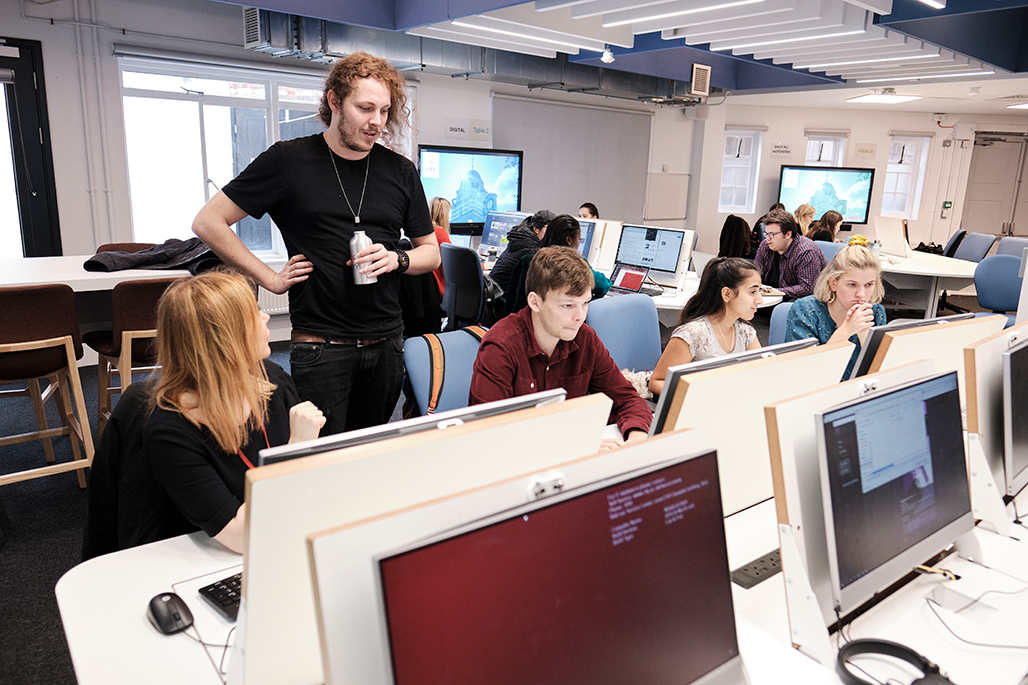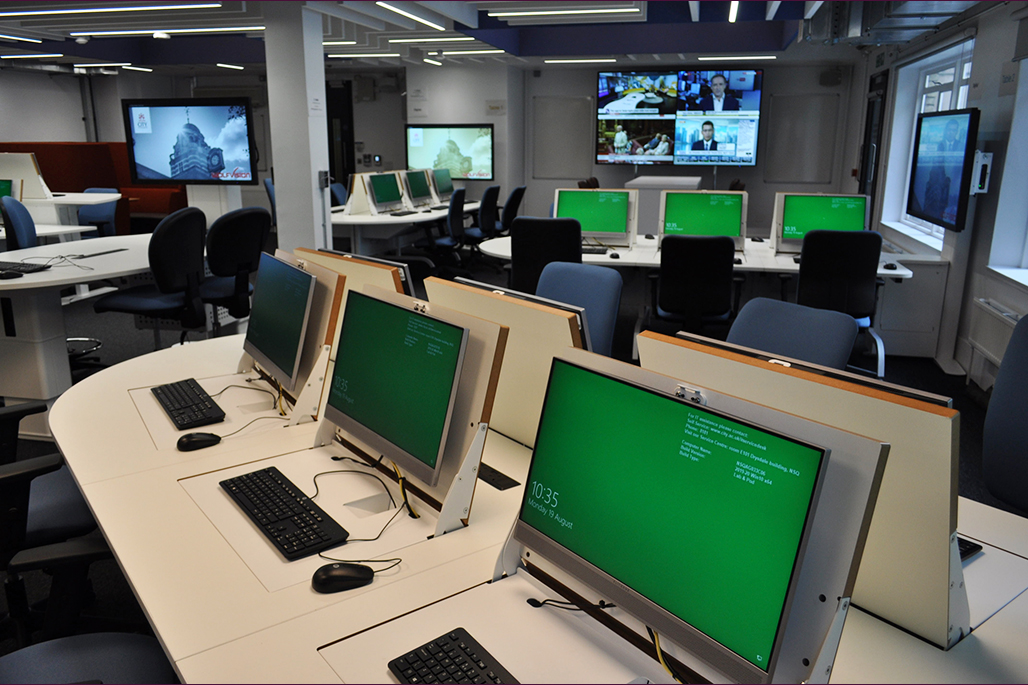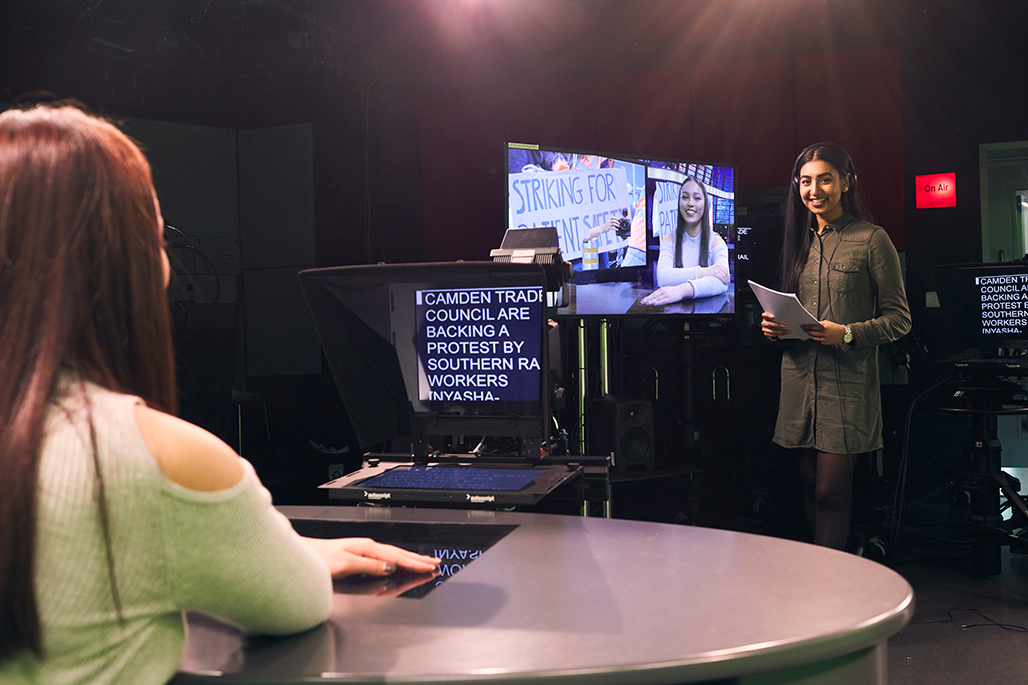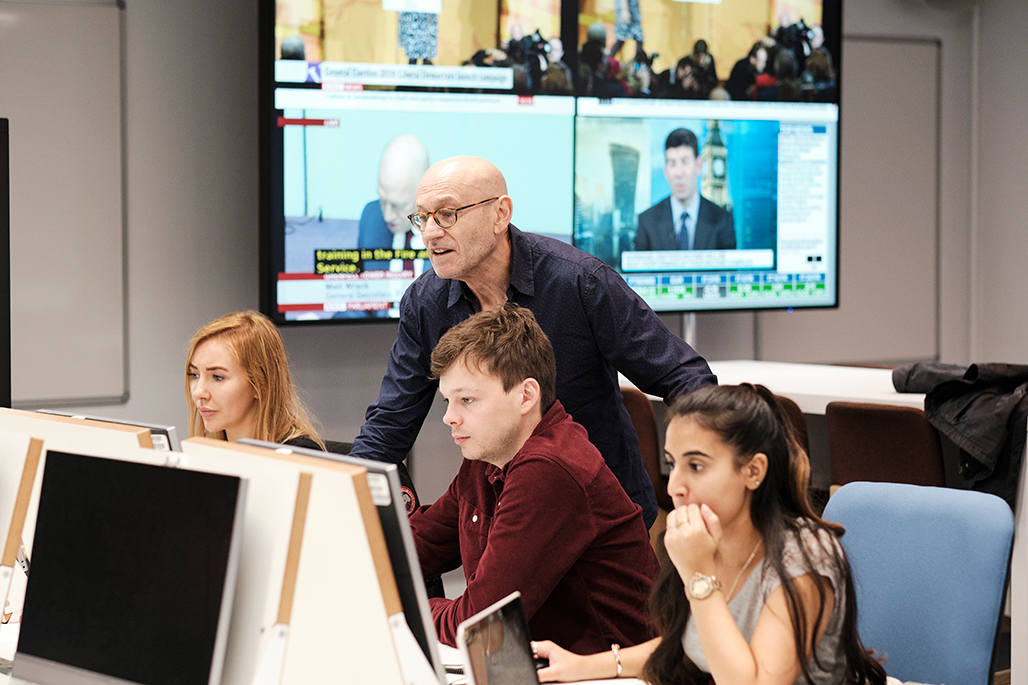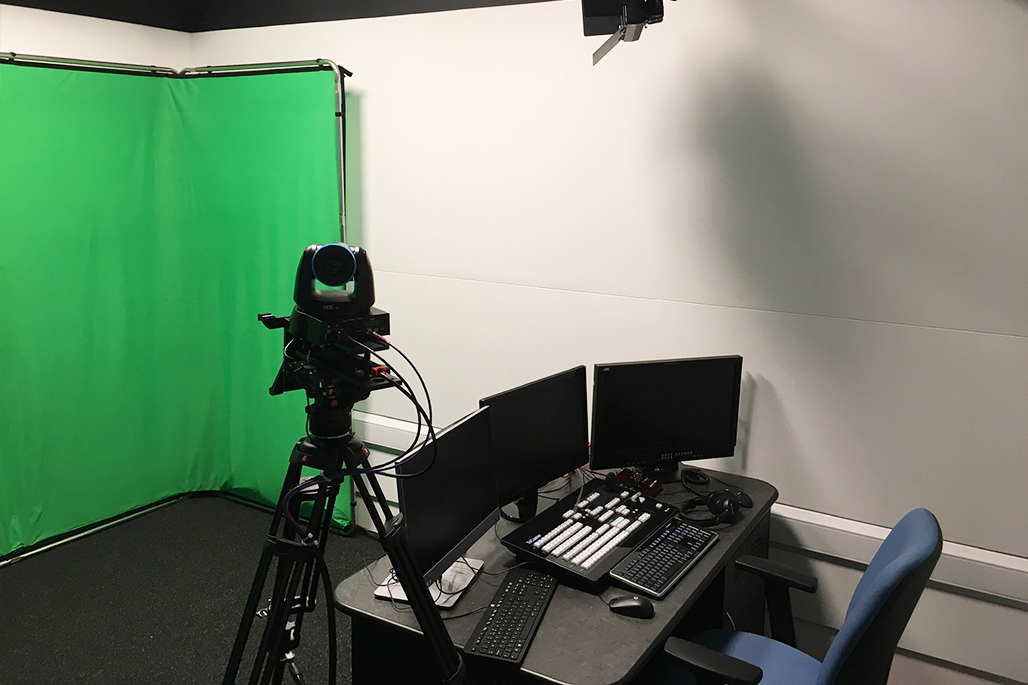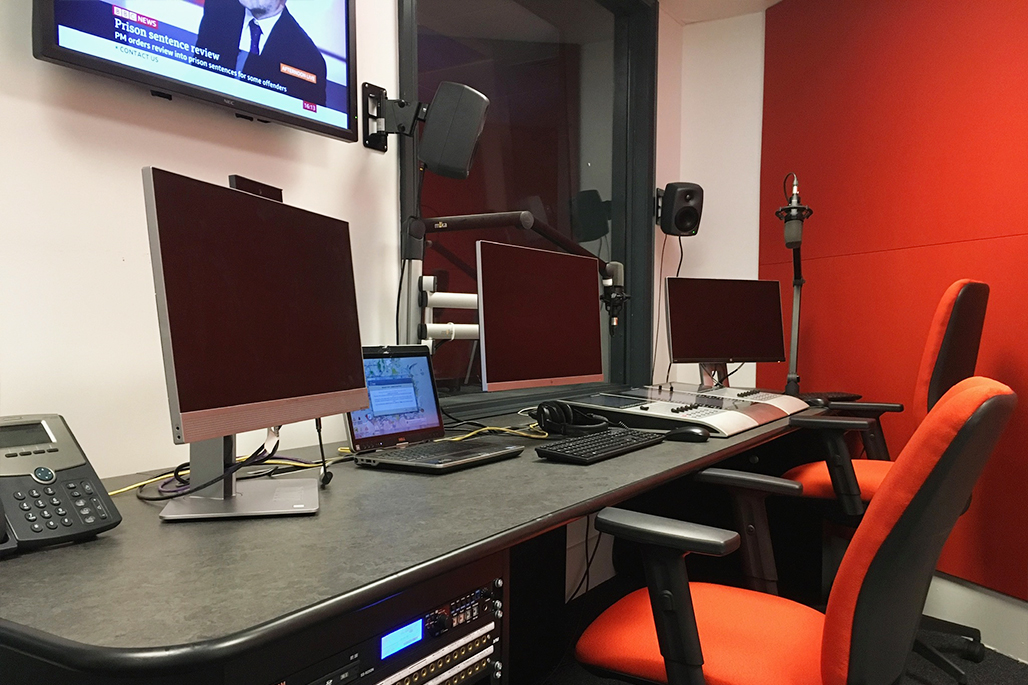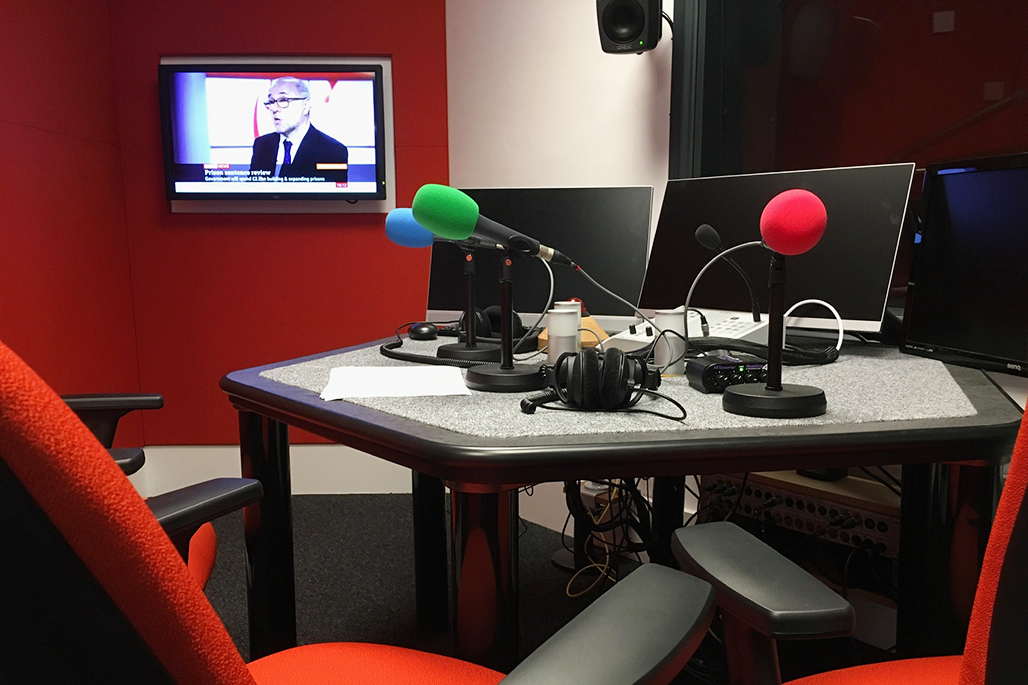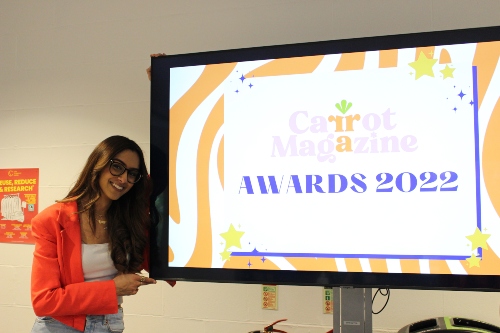-
UK
Tariff:
128 UCAS tariff points
International Baccalaureate:
31 points with 5 or better in three Higher Level subjects. A minimum of 5 in SL Maths and English will be required
GCSE:
A minimum of grade 4 (C) in GCSE English Language and Mathematics in addition to other outlined requirements.
Contextual offers
We apply a contextual admissions process for UK undergraduate applicants who have been in care, attend a low performing school, live in an area where few students go to university, or are the first generation of their family to enter Higher Education.
Those who are eligible may receive a conditional offer with reduced entry requirements, typically up to two grades lower for A-levels and one grade (or eight tariff points) for BTEC or mixed qualifications.
Mixed qualifications
Typically the only scenario where we make conditional offers expressed as UCAS tariff points is when an applicant presents mixed qualifications, most typically a combination of A Levels and a BTEC qualification.
In this instance, we may make a tariff point offer to present the applicant with more flexibility on equivalencies. In this case, please be aware that we may still ask for a specific score across certain qualifications and subjects. E.g. 'This offer is conditional on you achieving 128 tariff points. This must include A Level Mathematics at grade B.'
Subject exclusions
We do not accept General Studies and Critical Thinking. These subjects will not be included in any conditional offer we make.
Extended Project Qualification (EPQ)
We welcome applications from students who are completing relevant EPQ Projects. Whilst we recognise the value of these projects in preparing students for independent learning at university, the EPQ is unlikely to form part of any conditional offer we make.
The EPQ will also not lower the specifics of any conditional offer we choose to make. We will consider the EPQ as part of the holistic assessment of the application and it could be used to form part of our final decision at Confirmation stage.
AS levels
We recognise that there will be differences of opportunity varying by school and college. As not all students will have the opportunity to sit AS Level exams, it is unlikely we will include AS Level grades in any offer we choose to make. Where students have completed an AS Level subject, we will consider this as part of the holistic assessment of the application and it could be used to form part of our final decision at Confirmation stage.
University preparation programmes
If you do not qualify for direct entry, you may wish to take a foundation programme first. These programmes are designed to prepare students for entry to City's undergraduate courses.
Access to Higher Education
We welcome applications from under-represented backgrounds, mature students, and those who can demonstrate aptitude and experience of media and journalism in its broadest sense.
Those predicted lower grades but who can show evidence of involvement or aptitude in journalism may be considered for interview. Please be aware that Access students are often asked for further information to supplement their application, this is normally in the form of a questionnaire.
A typical offer for an Access applicant would be: Pass 60 credits, 45 Level 3 including at least 27 at distinction and the remaining 18 at merit. The Access qualification should be supplemented by at least a grade 4 (C) in Mathematics and English Language at GCSE.
-
Zimbabwe
The Zimbabwe GCE A Level is considered on a grade for grade basis with GCE A Levels.
Visa requirements
International Students coming to study in the UK may need to apply for a visa or entry clearance to come to the UK to study. The way that you apply may vary depending on the length of your course. There are different rules for:
- Students on courses of more than six months
- Students on courses of less than six months
For more information see our main Visa page.
-
Zambia
The School Certificate / General Certificate of Education.
Students must successfully complete a recognised foundation course.
Visa requirements
International Students coming to study in the UK may need to apply for a visa or entry clearance to come to the UK to study. The way that you apply may vary depending on the length of your course. There are different rules for:
- Students on courses of more than six months
- Students on courses of less than six months
For more information see our main Visa page.
-
Vietnam
Tot Nghiep Pho Thong Trung Hoc (Upper Secondary School Graduation Certificate) students must successfully complete a recognised foundation course.
Visa requirements
International Students coming to study in the UK may need to apply for a visa or entry clearance to come to the UK to study. The way that you apply may vary depending on the length of your course. There are different rules for:
- Students on courses of more than six months
- Students on courses of less than six months
For more information see our main Visa page.
-
Uzbekistan
Uzbekistan Certificate of Secondary Education.
Students must successfully complete a recognised foundation course.
Visa requirements
International Students coming to study in the UK may need to apply for a visa or entry clearance to come to the UK to study. The way that you apply may vary depending on the length of your course. There are different rules for:
- Students on courses of more than six months
- Students on courses of less than six months
For more information see our main Visa page.
-
Ukraine
Certificate of Complete General Secondary Education.
Students must successfully complete a recognised foundation course.
Visa requirements
International Students coming to study in the UK may need to apply for a visa or entry clearance to come to the UK to study. The way that you apply may vary depending on the length of your course. There are different rules for:
- Students on courses of more than six months
- Students on courses of less than six months
For more information see our main Visa page.
-
Uganda
Advanced Certificate in Education (UACE) is considered on a grade for grade basis with GCE A Levels.
Visa requirements
International Students coming to study in the UK may need to apply for a visa or entry clearance to come to the UK to study. The way that you apply may vary depending on the length of your course. There are different rules for:
- Students on courses of more than six months
- Students on courses of less than six months
For more information see our main Visa page.
-
USA
Advanced Placements.
Please refer to the UK entry requirements for this course, check for any prerequisites such as compulsory or preferred subject areas, and use the following as an indication of the US equivalent required.
The equivalents provided are intended as a guide only and individual applications are assessed on a case-by-case basis.
The following A-level equivalences to Advanced Placements will typically be applied:
- A-level AAA = Advanced Placements 555
- A-level AAB = Advanced Placements 554
- A-level ABB = Advanced Placements 544
- A-level BBB = Advanced Placements 444
- A-level BBC = Advanced Placements 443
- A-level BCC = Advanced Placements 433.
Visa requirements
International Students coming to study in the UK may need to apply for a visa or entry clearance to come to the UK to study. The way that you apply may vary depending on the length of your course. There are different rules for:
- Students on courses of more than six months
- Students on courses of less than six months
For more information see our main Visa page.
-
UAE
Thanawaya (General Secondary Education Certificate Examination)- students must successfully complete a recognised foundation course.
Visa requirements
International Students coming to study in the UK may need to apply for a visa or entry clearance to come to the UK to study. The way that you apply may vary depending on the length of your course. There are different rules for:
- Students on courses of more than six months
- Students on courses of less than six months
For more information see our main Visa page.
-
Turkey
Students must successfully complete a recognised foundation course.
Visa requirements
International Students coming to study in the UK may need to apply for a visa or entry clearance to come to the UK to study. The way that you apply may vary depending on the length of your course. There are different rules for:
- Students on courses of more than six months
- Students on courses of less than six months
For more information see our main Visa page.
-
Tunisia
Secondary certificate.
Students must successfully complete a recognised foundation course.
Visa requirements
International Students coming to study in the UK may need to apply for a visa or entry clearance to come to the UK to study. The way that you apply may vary depending on the length of your course. There are different rules for:
- Students on courses of more than six months
- Students on courses of less than six months
For more information see our main Visa page.
-
Thailand
Mathayom Suksa 6 (Senior High School Leaving Certificate) students must successfully complete a recognised foundation course.
Visa requirements
International Students coming to study in the UK may need to apply for a visa or entry clearance to come to the UK to study. The way that you apply may vary depending on the length of your course. There are different rules for:
- Students on courses of more than six months
- Students on courses of less than six months
For more information see our main Visa page.
-
Tanzania
Certificate of Secondary Education (CSE)
Students must successfully complete a recognised foundation course.
Visa requirements
International Students coming to study in the UK may need to apply for a visa or entry clearance to come to the UK to study. The way that you apply may vary depending on the length of your course. There are different rules for:
- Students on courses of more than six months
- Students on courses of less than six months
For more information see our main Visa page.
-
Taiwan
Senior High School Leaving Certificate students must successfully complete a recognised foundation course.
Junior College Diploma
The exact requirements from the above qualification differ between courses. Please contact Admissions to confirm the requirements for your course of interest.
Visa requirements
International Students coming to study in the UK may need to apply for a visa or entry clearance to come to the UK to study. The way that you apply may vary depending on the length of your course. There are different rules for:
- Students on courses of more than six months
- Students on courses of less than six months
For more information see our main Visa page.
-
Switzerland
Federal Maturity Certificate/Maturitatzeugnis/Cantonal Maturity Certificate. The exact requirements from the above qualification differ between courses. Please contact Admissions to confirm the requirements for your course of interest.
Visa requirements
International Students from within the European Economic Area (EEA) may need to apply for a Student visa or entry clearance to come to the UK to study if they do not have EU Settlement Status.
- Students on courses of more than six months
- Students on courses of less than six months.
For more information see our main Visa page.
-
Sweden
Avgångsbetyg / Slutbetyg från Gymnasieskola. The exact requirements from the above qualification differ between courses. Please contact Admissions to confirm the requirements for your course of interest.
Visa requirements
International Students from within the European Economic Area (EEA) may need to apply for a Student visa or entry clearance to come to the UK to study if they do not have EU Settlement Status.
- Students on courses of more than six months
- Students on courses of less than six months.
For more information see our main Visa page.
-
Sri Lanka
Sri Lankan General Certificate of Education (Advanced Level).
Considered equivalent to UK A-levels on a like for like basis.
Visa requirements
International Students coming to study in the UK may need to apply for a visa or entry clearance to come to the UK to study. The way that you apply may vary depending on the length of your course. There are different rules for:
- Students on courses of more than six months
- Students on courses of less than six months
For more information see our main Visa page.
-
Spain
Título de Bachillerato (LOGSE)
Please refer to the UK entry requirements for this course, check for any prerequisites such as compulsory or preferred subject areas, and use the following as an indication of the Polish equivalent required.
The equivalents provided are intended as a guide only and individual applications are assessed on a case-by-case basis.
The following A-level equivalences to Título de Bachillerato (LOGSE) will typically be applied:
- A-level AAA = 8
- A-level AAB = 7.8
- A-level ABB = 7.6
- A-level BBB = 7.4
- A-level BBC = 7.2
- A-level BCC = 7.
Please contact Admissions to confirm the requirements for your course of interest.
Visa requirements
International Students from within the European Economic Area (EEA) may need to apply for a Student visa or entry clearance to come to the UK to study if they do not have EU Settlement Status.
- Students on courses of more than six months
- Students on courses of less than six months.
For more information see our main Visa page.
-
South Korea
Korean High School Diploma students must successfully complete a recognised foundation course.
Visa requirements
International Students coming to study in the UK may need to apply for a visa or entry clearance to come to the UK to study. The way that you apply may vary depending on the length of your course. There are different rules for:
- Students on courses of more than six months
- Students on courses of less than six months
For more information see our main Visa page.
-
South Africa
The National Senior Certificate will be accepted for direct entry to certain undergraduate courses normally
The exact requirements from the above qualification differ between courses. Please contact Admissions to confirm the requirements for your course of interest.
Visa requirements
International Students coming to study in the UK may need to apply for a visa or entry clearance to come to the UK to study. The way that you apply may vary depending on the length of your course. There are different rules for:
- Students on courses of more than six months
- Students on courses of less than six months
For more information see our main Visa page.
-
Slovenia
Maturitetno spričevalo (Matura Certificate). The exact requirements from the above qualification differ between courses. Please contact Admissions to confirm the requirements for your course of interest.
Visa requirements
International Students from within the European Economic Area (EEA) may need to apply for a Student visa or entry clearance to come to the UK to study if they do not have EU Settlement Status.
- Students on courses of more than six months
- Students on courses of less than six months.
For more information see our main Visa page.
-
Slovakia
Vysvedčenie o maturitnej skúške (Secondary School Leaving Certificate). The exact requirements from the above qualification differ between courses. Please contact Admissions to confirm the requirements for your course of interest.
Visa requirements
International Students from within the European Economic Area (EEA) may need to apply for a Student visa or entry clearance to come to the UK to study if they do not have EU Settlement Status.
- Students on courses of more than six months
- Students on courses of less than six months.
For more information see our main Visa page.
-
Singapore
Singapore-Cambridge GCE A-levels considered equivalent to UK A-levels on a like-for-like basis.
Polytechnic Diploma students considered for year 1 or year 2 entry on a case-by-case basis depending on subjects taken and CGPA.
Please contact Admissions to confirm your eligibility and the requirements for your course of interest.
Visa requirements
International Students coming to study in the UK may need to apply for a visa or entry clearance to come to the UK to study. The way that you apply may vary depending on the length of your course. There are different rules for:
- Students on courses of more than six months
- Students on courses of less than six months
For more information see our main Visa page.
-
Serbia
Secondary School Leaving Diploma/Matura. The exact requirements from the above qualification differ between courses. Please contact Admissions to confirm the requirements for your course of interest.
Visa requirements
International Students coming to study in the UK may need to apply for a visa or entry clearance to come to the UK to study. The way that you apply may vary depending on the length of your course. There are different rules for:
- Students on courses of more than six months
- Students on courses of less than six months
For more information see our main Visa page.
-
Saudi Arabia
Thanawaya (General Secondary Education Certificate) - students must successfully complete a recognised foundation course.
Visa requirements
International Students coming to study in the UK may need to apply for a visa or entry clearance to come to the UK to study. The way that you apply may vary depending on the length of your course. There are different rules for:
- Students on courses of more than six months
- Students on courses of less than six months
For more information see our main Visa page.
-
Rwanda
The Rwanda Advanced Certificate of Education (A-level)
Students must successfully complete a recognised foundation course.
Visa requirements
International Students coming to study in the UK may need to apply for a visa or entry clearance to come to the UK to study. The way that you apply may vary depending on the length of your course. There are different rules for:
- Students on courses of more than six months
- Students on courses of less than six months
For more information see our main Visa page.
-
Russia
The Attestat o Srednam Obrazov
Students must successfully complete a recognised foundation course.
Visa requirements
International Students coming to study in the UK may need to apply for a visa or entry clearance to come to the UK to study. The way that you apply may vary depending on the length of your course. There are different rules for:
- Students on courses of more than six months
- Students on courses of less than six months
For more information see our main Visa page.
-
Romania
Diplomă de Bacalaureat. The exact requirements from the above qualification differ between courses. Please contact Admissions to confirm the requirements for your course of interest.
Visa requirements
International Students from within the European Economic Area (EEA) may need to apply for a Student visa or entry clearance to come to the UK to study if they do not have EU Settlement Status.
- Students on courses of more than six months
- Students on courses of less than six months.
For more information see our main Visa page.
-
Qatar
Thanawaya (General Secondary Education Certificate) - students must successfully complete a recognised foundation course.
Visa requirements
International Students coming to study in the UK may need to apply for a visa or entry clearance to come to the UK to study. The way that you apply may vary depending on the length of your course. There are different rules for:
- Students on courses of more than six months
- Students on courses of less than six months
For more information see our main Visa page.
-
Portugal
Diploma/Certificado Nível Secundário de Educação. The exact requirements from the above qualification differ between courses. Please contact Admissions to confirm the rquirements for your course of interest.
Visa requirements
International Students from within the European Economic Area (EEA) may need to apply for a Student visa or entry clearance to come to the UK to study if they do not have EU Settlement Status.
- Students on courses of more than six months
- Students on courses of less than six months.
For more information see our main Visa page.
-
Poland
Swiadectwo Dojrzałości / Matura.
Please refer to the UK entry requirements for this course, check for any prerequisites such as compulsory or preferred subject areas, and use the following as an indication of the Polish equivalent required.
The equivalents provided are intended as a guide only and individual applications are assessed on a case-by-case basis.
The following A-level equivalences to Swiadectwo Dojrzałości / Matura will typically be applied:
- A-level AAA = Swiadectwo Dojrzałości / Matura 80% average from 3 extended subjects
- A-level AAB = Swiadectwo Dojrzałości / Matura 78% average from 3 extended subjects
- A-level ABB = Swiadectwo Dojrzałości / Matura 76% average from 3 extended subjects
- A-level BBB = Swiadectwo Dojrzałości / Matura 74% average from 3 extended subjects
- A-level BBC = Swiadectwo Dojrzałości / Matura 72% average from 3 extended subjects
- A-level BCC = Swiadectwo Dojrzałości / Matura 70% average from 3 extended subjects.
Visa requirements
International Students from within the European Economic Area (EEA) may need to apply for a Student visa or entry clearance to come to the UK to study if they do not have EU Settlement Status.
- Students on courses of more than six months
- Students on courses of less than six months.
For more information see our main Visa page.
-
Pakistan
Higher Secondary Certificate (HSC).
Students must successfully complete a recognised foundation course.
Visa requirements
International Students coming to study in the UK may need to apply for a visa or entry clearance to come to the UK to study. The way that you apply may vary depending on the length of your course. There are different rules for:
- Students on courses of more than six months
- Students on courses of less than six months
For more information see our main Visa page.
-
Oman
Thanawaya (General Education Diploma) - students must successfully complete a recognised foundation course.
Visa requirements
International Students coming to study in the UK may need to apply for a visa or entry clearance to come to the UK to study. The way that you apply may vary depending on the length of your course. There are different rules for:
- Students on courses of more than six months
- Students on courses of less than six months
For more information see our main Visa page.
-
Norway
Vitnemål fra den Videregående Skole (VVO). The exact requirements MAY differ between courses.
Please refer to the UK entry requirements for this course, check for any prerequisites such as compulsory or preferred subject areas, and use the following as an indication of the Norwegian equivalent required.
The equivalents provided are intended as a guide only and individual applications are assessed on a case-by-case basis.
The following A-level equivalences to Vitnemal will typically be applied:
- A-level AAA = 5
- A-level AAB = 4.5
- A-level ABB = 4.5
- A-level BBB = 4
- A-level BBC = 4
- A-level BCC = 3.5
Please contact Admissions to confirm the requirements for your course of interest.
Visa requirements
International Students from within the European Economic Area (EEA) may need to apply for a Student visa or entry clearance to come to the UK to study if they do not have EU Settlement Status.
- Students on courses of more than six months
- Students on courses of less than six months.
For more information see our main Visa page.
-
Nigeria
Senior School Certificate/West African Senior School Certificate
Students must successfully complete a recognised foundation course.
Visa requirements
International Students coming to study in the UK may need to apply for a visa or entry clearance to come to the UK to study. The way that you apply may vary depending on the length of your course. There are different rules for:
- Students on courses of more than six months
- Students on courses of less than six months
For more information see our main Visa page.
-
Netherlands
Voorbereidend Wetenschappelijk Onderwijs (VWO). The exact requirements from the above qualification differ between courses. Please contact Admissions to confirm the requirements for your course of interest.
Visa requirements
International Students from within the European Economic Area (EEA) may need to apply for a Student visa or entry clearance to come to the UK to study if they do not have EU Settlement Status.
- Students on courses of more than six months
- Students on courses of less than six months.
For more information see our main Visa page.
-
Morocco
The Moroccan Diplôme du Baccalauréat/Attestation du Baccalauréat
Students must successfully complete a recognised foundation course.
Visa requirements
International Students coming to study in the UK may need to apply for a visa or entry clearance to come to the UK to study. The way that you apply may vary depending on the length of your course. There are different rules for:
- Students on courses of more than six months
- Students on courses of less than six months
For more information see our main Visa page.
-
Mexico
Titulo Académico de Bachiller / Diploma de Bachiller / Bachillerato General - students must successfully complete a recognised foundation course.
Visa requirements
International Students coming to study in the UK may need to apply for a visa or entry clearance to come to the UK to study. The way that you apply may vary depending on the length of your course. There are different rules for:
- Students on courses of more than six months
- Students on courses of less than six months
For more information see our main Visa page.
-
Mauritius
The CIE A Level sat in Mauritius is considered on a grade for grade basis with GCE A Levels sat in the UK.
Visa requirements
International Students coming to study in the UK may need to apply for a visa or entry clearance to come to the UK to study. The way that you apply may vary depending on the length of your course. There are different rules for:
- Students on courses of more than six months
- Students on courses of less than six months
For more information see our main Visa page.
-
Malta
Advanced Matriculation and Matriculation Certificate Examination are comparable to A Levels with the same grading system as UK A levels.
Visa requirements
International Students coming to study in the UK may need to apply for a visa or entry clearance to come to the UK to study. The way that you apply may vary depending on the length of your course. There are different rules for:
- Students on courses of more than six months
- Students on courses of less than six months
For more information see our main Visa page.
-
Malaysia
STPM / UEC.
Please refer to the UK entry requirements for this course, check for any prerequisites such as compulsory or preferred subject areas, and use the following as an indication of the Malaysian equivalent required.
The equivalents provided are intended as a guide only and individual applications are assessed on a case-by-case basis.
The following A-level equivalences to STPM will typically be applied:
- A-level AAA = STPM AAA
- A-level AAB = STPM AAB
- A-level ABB = STPM ABB
- A-level BBB = STPM BBB
- A-level BBC = STPM BBC
- A-level BCC = STPM BCC.
The following A-level equivalences to UEC will typically be applied:
- A-level AAA = UEC AAAAAA
- A-level AAB = UEC AAAABB
- A-level ABB = UEC AABBBB
- A-level BBB = UEC BBBBBB
- A-level BBC = UEC BBBBCC
- A-level BCC = UEC BBCCCC.
Visa requirements
International Students coming to study in the UK may need to apply for a visa or entry clearance to come to the UK to study. The way that you apply may vary depending on the length of your course. There are different rules for:
- Students on courses of more than six months
- Students on courses of less than six months
For more information see our main Visa page.
-
Luxembourg
Diplôme de Fin d'Etudes Secondaires. The exact requirements from the above qualification differ between courses. Please contact Admissions to confirm the requirements for your course of interest.
Visa requirements
International Students from within the European Economic Area (EEA) may need to apply for a Student visa or entry clearance to come to the UK to study if they do not have EU Settlement Status.
- Students on courses of more than six months
- Students on courses of less than six months.
For more information see our main Visa page.
-
Lithuania
Brandos Atestatas (Certificate of Maturity). The exact requirements from the above qualification differ between courses. Please contact Admissions to confirm the requirements for your course of interest.
Visa requirements
International Students from within the European Economic Area (EEA) may need to apply for a Student visa or entry clearance to come to the UK to study if they do not have EU Settlement Status.
- Students on courses of more than six months
- Students on courses of less than six months.
For more information see our main Visa page.
-
Lebanon
Lebanese Baccalaureate - students must successfully complete a recognised foundation course.
Visa requirements
International Students coming to study in the UK may need to apply for a visa or entry clearance to come to the UK to study. The way that you apply may vary depending on the length of your course. There are different rules for:
- Students on courses of more than six months
- Students on courses of less than six months
For more information see our main Visa page.
-
Latvia
Atestats par visparejo videjo izglitibu (Certificate of General Secondary Education). The exact requirements from the above qualification differ between courses.
Please contact Admissions to confirm the requirements for your course of interest.
Visa requirements
International Students from within the European Economic Area (EEA) may need to apply for a Student visa or entry clearance to come to the UK to study if they do not have EU Settlement Status.
- Students on courses of more than six months
- Students on courses of less than six months.
For more information see our main Visa page.
-
Kuwait
Thanawaya (General Secondary Education Certificate) - students must successfully complete a recognised foundation course.
Visa requirements
International Students coming to study in the UK may need to apply for a visa or entry clearance to come to the UK to study. The way that you apply may vary depending on the length of your course. There are different rules for:
- Students on courses of more than six months
- Students on courses of less than six months
For more information see our main Visa page.
-
Kenya
Kenya Certificate of Secondary Education (KCSE)
Students must successfully complete a recognised foundation course.
Visa requirements
International Students coming to study in the UK may need to apply for a visa or entry clearance to come to the UK to study. The way that you apply may vary depending on the length of your course. There are different rules for:
- Students on courses of more than six months
- Students on courses of less than six months
For more information see our main Visa page.
-
Kazakhstan
Certificate of Completed Secondary Education.
Students must successfully complete a recognised foundation course.
Visa requirements
International Students coming to study in the UK may need to apply for a visa or entry clearance to come to the UK to study. The way that you apply may vary depending on the length of your course. There are different rules for:
- Students on courses of more than six months
- Students on courses of less than six months
For more information see our main Visa page.
-
Jordan
Thanawaya (Certificate of General Secondary Education) - students must successfully complete a recognised foundation course.
Visa requirements
International Students coming to study in the UK may need to apply for a visa or entry clearance to come to the UK to study. The way that you apply may vary depending on the length of your course. There are different rules for:
- Students on courses of more than six months
- Students on courses of less than six months
For more information see our main Visa page.
-
Japan
Kotogakko Sotsugyo Shomeisho (Upper Secondary School Leaving Certificate) students must successfully complete a recognised foundation course.
Senmonshi (vocational degree), Jun-Gakushi (associate degree) and Tanki Daigaku Shuryo Shoshois (Junior College Certificate of Graduation) considered for direct entry on a case-by-case basis. Please contact Admissions to confirm the requirements for your course of interest.
Visa requirements
International Students coming to study in the UK may need to apply for a visa or entry clearance to come to the UK to study. The way that you apply may vary depending on the length of your course. There are different rules for:
- Students on courses of more than six months
- Students on courses of less than six months
For more information see our main Visa page.
-
Italy
Diploma di Esame di Stato.
Please refer to the UK entry requirements for this course, check for any prerequisites such as compulsory or preferred subject areas, and use the following as an indication of the Italian equivalent required.
The equivalents provided are intended as a guide only and individual applications are assessed on a case-by-case basis.
The following A-level equivalences to Diploma di Esame di Stato will typically be applied:
- A-level AAA = Diploma di Esame di Stato 85%
- A-level AAB = Diploma di Esame di Stato 84%
- A-level ABB = Diploma di Esame di Stato 80%
- A-level BBB = Diploma di Esame di Stato 78%
- A-level BBC = Diploma di Esame di Stato 76%
- A-level BCC = Diploma di Esame di Stato 74%.
Visa requirements
International Students from within the European Economic Area (EEA) may need to apply for a Student visa or entry clearance to come to the UK to study if they do not have EU Settlement Status.
- Students on courses of more than six months
- Students on courses of less than six months.
For more information see our main Visa page.
-
Ireland
Irish Leaving Certificate. The exact requirements from the above qualification differ between courses. Please contact Admissions to confirm the requirements for your course of interest.
Visa requirements
International Students from within the European Economic Area (EEA) may need to apply for a Student visa or entry clearance to come to the UK to study if they do not have EU Settlement Status.
- Students on courses of more than six months
- Students on courses of less than six months.
For more information see our main Visa page.
-
Indonesia
Surat Tanda Tamat Belajar Sekolah Menengah Umum Tingkat Atas (Senior Secondary School Certificate of Completion) students must successfully complete a recognised foundation course.
Diploma III & IV students considered for year 1 entry on a case-by-case basis. Please contact Admissions to confirm the requirements for your course of interest.
Visa requirements
International Students coming to study in the UK may need to apply for a visa or entry clearance to come to the UK to study. The way that you apply may vary depending on the length of your course. There are different rules for:
- Students on courses of more than six months
- Students on courses of less than six months
For more information see our main Visa page.
-
India
HSC XII
Please refer to the UK entry requirements for this course, check for any prerequisites such as compulsory or preferred subject areas, and use the following as an indication of the Indian equivalent required.
The equivalents provided are intended as a guide only and individual applications are assessed on a case-by-case basis.
The following A-level equivalences to HSC XII will typically be applied:
- A-level AAA = CBSE & ICSE Exam Board HSC XII 80%
- A-level AAB = CBSE & ICSE Exam Board HSC XII 78%
- A-level ABB = CBSE & ICSE Exam Board HSC XII 76%
- A-level BBB = CBSE & ICSE Exam Board HSC XII 74%
- A-level BBC = CBSE & ICSE Exam Board HSC XII 72%
- A-level BCC = CBSE & ICSE Exam Board HSC XII 70%
Visa requirements
International Students coming to study in the UK may need to apply for a visa or entry clearance to come to the UK to study. The way that you apply may vary depending on the length of your course. There are different rules for:
- Students on courses of more than six months
- Students on courses of less than six months
For more information see our main Visa page.
-
Iceland
Stúdentspróf. The exact requirements from the above qualification differ between courses. Please contact Admissions to confirm the requirements for your course of interest.
Visa requirements
International Students from within the European Economic Area (EEA) may need to apply for a Student visa or entry clearance to come to the UK to study if they do not have EU Settlement Status.
- Students on courses of more than six months
- Students on courses of less than six months.
For more information see our main Visa page.
-
Hungary
Érettségi. The exact requirements from the above qualification differ between courses. Please contact Admissions to confirm the requirements for your course of interest.
Visa requirements
International Students from within the European Economic Area (EEA) may need to apply for a Student visa or entry clearance to come to the UK to study if they do not have EU Settlement Status.
- Students on courses of more than six months
- Students on courses of less than six months.
For more information see our main Visa page.
-
Hong Kong
Hong Kong Diploma of Secondary Education.
Please refer to the UK entry requirements for this course, check for any prerequisites such as compulsory or preferred subject areas, and use the following as an indication of the Hong Kong equivalent required.
The equivalents provided are intended as a guide only and individual applications are assessed on a case-by-case basis.
The following A-level equivalences to HKDSE will typically be applied:
- A-level AAA = HKSDE 555 (excluding Liberal Studies and Chinese)
- A-level AAB = HKSDE 555 (excluding Liberal Studies and Chinese)
- A-level ABB = HKSDE 554 (excluding Liberal Studies and Chinese)
- A-level BBB = HKSDE 554 (excluding Liberal Studies and Chinese)
- A-level BBC = HKSDE 544 (excluding Liberal Studies and Chinese)
- A-level BCC = HKSDE 544 (excluding Liberal Studies and Chinese).
Visa requirements
International Students coming to study in the UK may need to apply for a visa or entry clearance to come to the UK to study. The way that you apply may vary depending on the length of your course. There are different rules for:
- Students on courses of more than six months
- Students on courses of less than six months
For more information see our main Visa page.
-
Greece
Greek Apolytirion. Please note that exact requirements may differ between courses.
Please refer to the UK entry requirements for this course, check for any prerequisites such as compulsory or preferred subject areas, and use the following as an indication of the Greek equivalent required.
The equivalents provided are intended as a guide only and individual applications are assessed on a case-by-case basis.
The following A-level equivalences to Greek Apolytirion will typically be applied:
- A-level AAA = 18/20 plus; 18/20 in two PanHellenics
- A-level AAB = 18/20 plus; 17/20 in two PanHellenics
Please contact Admissions to confirm the requirements for your course of interest.
Visa requirements
International Students from within the European Economic Area (EEA) may need to apply for a Student visa or entry clearance to come to the UK to study if they do not have EU Settlement Status.
- Students on courses of more than six months
- Students on courses of less than six months.
For more information see our main Visa page.
-
Ghana
Senior School Certificate/West African Senior School Certificate
Students must successfully complete a recognised foundation course.
Visa requirements
International Students coming to study in the UK may need to apply for a visa or entry clearance to come to the UK to study. The way that you apply may vary depending on the length of your course. There are different rules for:
- Students on courses of more than six months
- Students on courses of less than six months
For more information see our main Visa page.
-
Germany
German Abitur.
Please refer to the UK entry requirements for this course, check for any prerequisites such as compulsory or preferred subject areas, and use the following as an indication of the German equivalent required.
The equivalents provided are intended as a guide only and individual applications are assessed on a case-by-case basis.
The following A-level equivalences to Abitur will typically be applied:
- A-level AAA = Abitur 1.8
- A-level AAB = Abitur 2.0
- A-level ABB = Abitur 2.2
- A-level BBB = Abitur 2.4
- A-level BBC = Abitur 2.6
- A-level BCC = Abitur 2.8.
Visa requirements
International Students from within the European Economic Area (EEA) may need to apply for a Student visa or entry clearance to come to the UK to study if they do not have EU Settlement Status.
- Students on courses of more than six months
- Students on courses of less than six months.
For more information see our main Visa page.
-
France
French Baccalaureate.
Please refer to the UK entry requirements for this course, check for any prerequisites such as compulsory or preferred subject areas, and use the following as an indication of the French equivalent required.
The equivalents provided are intended as a guide only and individual applications are assessed on a case-by-case basis.
The following A-level equivalences to French Baccalaureate will typically be applied:
- A-level AAA = French Baccalaureate 15/20
- A-level AAB = French Baccalaureate 14/20
- A-level ABB = French Baccalaureate 13/20
- A-level BBB = French Baccalaureate 12.5/20
- A-level BBC = French Baccalaureate 12/20
- A-level BCC = French Baccalaureate 11.5/20.
Visa requirements
International Students from within the European Economic Area (EEA) may need to apply for a Student visa or entry clearance to come to the UK to study if they do not have EU Settlement Status.
- Students on courses of more than six months
- Students on courses of less than six months.
For more information see our main Visa page.
-
Estonia
Gümnaasiumi loputunnistus with the Riigieksamitunnistus (Secondary School Leaving Certificate with the State Examination Certificate).
The exact requirements from the above qualification differ between courses. Please contact Admissions to confirm the requirements for your course of interest.
Visa requirements
International Students from within the European Economic Area (EEA) may need to apply for a Student visa or entry clearance to come to the UK to study if they do not have EU Settlement Status.
- Students on courses of more than six months
- Students on courses of less than six months.
For more information see our main Visa page.
-
Egypt
Certificate of Nile International Secondary Education
Students must successfully complete a recognised foundation course.
Visa requirements
International Students coming to study in the UK may need to apply for a visa or entry clearance to come to the UK to study. The way that you apply may vary depending on the length of your course. There are different rules for:
- Students on courses of more than six months
- Students on courses of less than six months
For more information see our main Visa page.
-
Denmark
Hojere Forberedelseseksamen (HF). The exact requirements from the above qualification differ between courses. Please contact Admissions to confirm the requirements for your course of interest.
Visa requirements
International Students from within the European Economic Area (EEA) may need to apply for a Student visa or entry clearance to come to the UK to study if they do not have EU Settlement Status.
- Students on courses of more than six months
- Students on courses of less than six months.
For more information see our main Visa page.
-
Czech Republic
Vysvědčení o maturitní zkoušce / Maturita (Secondary School Leaving Certificate). The exact requirements from the above qualification differ between courses.
Please contact Admissions to confirm the requirements for your course of interest.
Visa requirements
International Students from within the European Economic Area (EEA) may need to apply for a Student visa or entry clearance to come to the UK to study if they do not have EU Settlement Status.
- Students on courses of more than six months
- Students on courses of less than six months.
For more information see our main Visa page.
-
Cyprus
Apolytirion. The exact requirements from the above qualification differ between courses. Please contact Admissions to confirm the requirements for your course of interest.
The following A-level equivalences to Apolytirion will typically be applied:
- A-level AAA = 19 (91 – 95)
- A-level AAB = 18.5 (88 – 90)
- A-level ABB = 18 (86 – 90)
- A-level BBB = 18 (86 – 90)
- A-level BBC = 17.5 (83 – 85).
Visa requirements
International Students from within the European Economic Area (EEA) may need to apply for a Student visa or entry clearance to come to the UK to study if they do not have EU Settlement Status.
- Students on courses of more than six months
- Students on courses of less than six months.
For more information see our main Visa page.
-
Croatia
Maturalna svjedodzba (Matura Certificate). The exact requirements from the above qualification differ between courses. Please contact Admissions to confirm the requirements for your course of interest.
Visa requirements
International Students from within the European Economic Area (EEA) may need to apply for a Student visa or entry clearance to come to the UK to study if they do not have EU Settlement Status.
- Students on courses of more than six months
- Students on courses of less than six months.
For more information see our main Visa page.
-
Columbia
Bachiller Académico/Technico
Students must successfully complete a recognised foundation course.
Visa requirements
International Students coming to study in the UK may need to apply for a visa or entry clearance to come to the UK to study. The way that you apply may vary depending on the length of your course. There are different rules for:
- Students on courses of more than six months
- Students on courses of less than six months
For more information see our main Visa page.
-
China
Senior High School Certificate students must successfully complete a recognised foundation course.
Gaokao students with exceptional grades considered for direct entry on a case-by-case basis. Please contact Admissions to confirm the requirements for your course of interest.
Visa requirements
International Students coming to study in the UK may need to apply for a visa or entry clearance to come to the UK to study. The way that you apply may vary depending on the length of your course. There are different rules for:
- Students on courses of more than six months
- Students on courses of less than six months
For more information see our main Visa page.
-
Canada
Grade 12 high school graduation certificate / diploma. Please note that exact requirements may differ between provinces.
Please refer to the UK entry requirements for this course, check for any prerequisites such as compulsory or preferred subject areas, and use the following as an indication of the Canadian equivalent required.
The equivalents provided are intended as a guide only and individual applications are assessed on a case-by-case basis.
The following A-level equivalences to Canadian year 12 Diplomas will typically be applied:
- A-level AAA = 85% average across 5 best Grade 12 subjects
- A-level AAB = 80% average across 5 best Grade 12 subjects
- A-level ABB = 77% average across 5 best Grade 12 subjects
- A-level BBB = 75% average across 5 best Grade 12 subjects
- A-level BBC = 72% average across 5 best Grade 12 subjects
- A-level BCC = 70% average across 5 best Grade 12 subjects.
Visa requirements
International Students coming to study in the UK may need to apply for a visa or entry clearance to come to the UK to study. The way that you apply may vary depending on the length of your course. There are different rules for:
- Students on courses of more than six months
- Students on courses of less than six months
For more information see our main Visa page.
-
Cameroon
The Cameroonian GGCE is normally considered like for like with UK A levels.
Visa requirements
International Students coming to study in the UK may need to apply for a visa or entry clearance to come to the UK to study. The way that you apply may vary depending on the length of your course. There are different rules for:
- Students on courses of more than six months
- Students on courses of less than six months
For more information see our main Visa page.
-
Bulgaria
Diploma Za Sredno Obrazovanie.
Please refer to the UK entry requirements for this course, check for any prerequisites such as compulsory or preferred subject areas, and use the following as an indication of the Bulgarian equivalent required.
The equivalents provided are intended as a guide only and individual applications are assessed on a case-by-case basis.
The following A-level equivalences to Diploma Za Sredno Obrazovanie will typically be applied:
- A-level ABB = Diploma Za Sredno Obrazovanie 5.3 average and 5 in state exams
- A-level BBB = Diploma Za Sredno Obrazovanie 5.0 average and 4 in state exams
- A-level BBC = Diploma Za Sredno Obrazovanie 4.5 average and 4 in state exams
- A-level BCC = Diploma Za Sredno Obrazovanie 4.0 average and 4 in state exams
- A-level CCC = Diploma Za Sredno Obrazovanie 4.0 average and 4 in state exams.
Visa requirements
International Students from within the European Economic Area (EEA) may need to apply for a Student visa or entry clearance to come to the UK to study if they do not have EU Settlement Status.
- Students on courses of more than six months
- Students on courses of less than six months.
For more information see our main Visa page.
-
Brunei
Brunei-Cambridge GCE A-levels considered equivalent to UK A-levels on a like for like basis.
Visa requirements
International Students coming to study in the UK may need to apply for a visa or entry clearance to come to the UK to study. The way that you apply may vary depending on the length of your course. There are different rules for:
- Students on courses of more than six months
- Students on courses of less than six months
For more information see our main Visa page.
-
Brazil
- Certificado de Conclusao de Ensino Médio
- Certificado de Conclusao de Segundo Grau
Students must successfully complete a recognised foundation course.
Visa requirements
International Students coming to study in the UK may need to apply for a visa or entry clearance to come to the UK to study. The way that you apply may vary depending on the length of your course. There are different rules for:
- Students on courses of more than six months
- Students on courses of less than six months
For more information see our main Visa page.
-
Botswana
Botswana National qualifications
Students must successfully complete a recognised foundation course.
Visa requirements
International Students coming to study in the UK may need to apply for a visa or entry clearance to come to the UK to study. The way that you apply may vary depending on the length of your course. There are different rules for:
- Students on courses of more than six months
- Students on courses of less than six months
For more information see our main Visa page.
-
Belgium
Diploma van Secundair Onderwijs/Certificat d'Enseignement Secondaire Supérieur.
The exact requirements from the above qualification differ between courses. Please contact Admissions to confirm the requirements for your course of interest.
Visa requirements
International Students from within the European Economic Area (EEA) may need to apply for a Student visa or entry clearance to come to the UK to study if they do not have EU Settlement Status.
- Students on courses of more than six months
- Students on courses of less than six months.
For more information see our main Visa page.
-
Bangladesh
Higher Secondary Certificate (HSC).
Students must successfully complete a recognised foundation course.
Visa requirements
International Students coming to study in the UK may need to apply for a visa or entry clearance to come to the UK to study. The way that you apply may vary depending on the length of your course. There are different rules for:
- Students on courses of more than six months
- Students on courses of less than six months
For more information see our main Visa page.
-
Bahrain
Thanawaya (General Secondary Education Certificate) - students must successfully complete a recognised foundation course.
Visa requirements
International Students coming to study in the UK may need to apply for a visa or entry clearance to come to the UK to study. The way that you apply may vary depending on the length of your course. There are different rules for:
- Students on courses of more than six months
- Students on courses of less than six months
For more information see our main Visa page.
-
Azerbaijan
General Secondary Education Certificate.
Students must successfully complete a recognised foundation course.
Visa requirements
International Students coming to study in the UK may need to apply for a visa or entry clearance to come to the UK to study. The way that you apply may vary depending on the length of your course. There are different rules for:
- Students on courses of more than six months
- Students on courses of less than six months
For more information see our main Visa page.
-
Austria
Reifeprufungszeugnis/Maturazeugnis. The exact requirements from the above qualification differ between courses. Please contact Admissions to confirm the requirements for your course of interest.
Visa requirements
International Students from within the European Economic Area (EEA) may need to apply for a Student visa or entry clearance to come to the UK to study if they do not have EU Settlement Status.
- Students on courses of more than six months
- Students on courses of less than six months.
For more information see our main Visa page.
-
Argentina
Titulo de Bachiller.
Students must successfully complete a recognised foundation course.
Visa requirements
International Students coming to study in the UK may need to apply for a visa or entry clearance to come to the UK to study. The way that you apply may vary depending on the length of your course. There are different rules for:
- Students on courses of more than six months
- Students on courses of less than six months
For more information see our main Visa page.
-
Algeria
The Baccalaureat de l'Enseignement Secondaire
Students must successfully complete a recognised foundation course.
Visa requirements
International Students coming to study in the UK may need to apply for a visa or entry clearance to come to the UK to study. The way that you apply may vary depending on the length of your course. There are different rules for:
- Students on courses of more than six months
- Students on courses of less than six months
For more information see our main Visa page.
-
Albania
Diplome e Matures Shteterore (Diploma of State Matura). Students must successfully complete a recognised foundation course. Alternatively, IB, A Levels, or other European system will be considered.
Visa requirements
International Students coming to study in the UK may need to apply for a visa or entry clearance to come to the UK to study. The way that you apply may vary depending on the length of your course. There are different rules for:
- Students on courses of more than six months
- Students on courses of less than six months
For more information see our main Visa page.
-
Other
If you are unable to find your country equivalents in the above list, City will consider other international qualifications on a case by case basis.
Please contact the Admissions team for more details.
